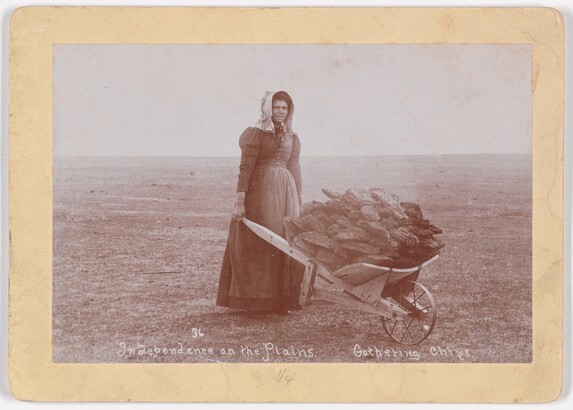One of my favorite photographs hangs in my bathroom.
At its center is a wheelbarrow, with wooden handles, braces, and legs. The ten-spoke wheel is iron. Cow chips – dry dung – are stacked two feet high in the tray. They also litter the grassy landscape, which is over-exposed and unending. In black and white, each chip looks like a slab of igneous rock, recently cooled.
Beside the wheelbarrow is a woman – Cather’s Ántonia, but grittier. She wears a checkered dress: high neck, full sleeves, and ankle-length hem. There’s a prairie gust, and the fabric billows at her shoulders and knees. Her apron catches the light as it rounds her hips. A bonnet arches over her face, like the canvas of a Conestoga wagon.
She holds the legs of the wheelbarrow several inches off the ground. Her elbows and wrists are locked. She knows that it’s prone to tipping sideways. The backs of her broad hands look as smooth as the wood, but that must be a trick of the light. The cold air blanches her parted lips. Her tongue presses against her front teeth in a “th” sound. It’s as if she’s asking, “Is this really the photograph that you’d like to take?”
She knows that photographs can be printed, again and again. She knows that this one will spread across nineteenth century America – up and down the Eastern Seaboard, where pioneer fantasies make for tea-time amusement. What will they think of her, gathering chips?
But that’s just one interpretation. The chips are her reality – her fertilizer and fuel. She may, in fact, be saying, “This pose will capture it best.” She may, even, be thinking that revulsion is ignorance – that the nation owes its dinner to cow chips.
More likely, though, she’s thinking about what she has left to do that day. A man under a black cloth has been manipulating focus and depth for a quarter of an hour. She’s been holding still, but her shoulders have begun to ache. To the photographer, her wheelbarrow and its contents are a prop. To her, they are the work of an afternoon. She needs them to cook and to warm her home. It’s about time that she steps out of the frame.
“Independence on the Plains” is the title inscribed at the photograph’s base. The grand sentiment and decorative script play against the scene itself. To someone, the photographer or the printer, it made a funny caption. And I’ve let that humor linger. I’ve hung the photograph in my bathroom, drawing a crass parallel between her chips and ours. I laugh about it with guests and, sometimes, alone.
Lately, I’ve been wondering if I’m laughing at her expense.
